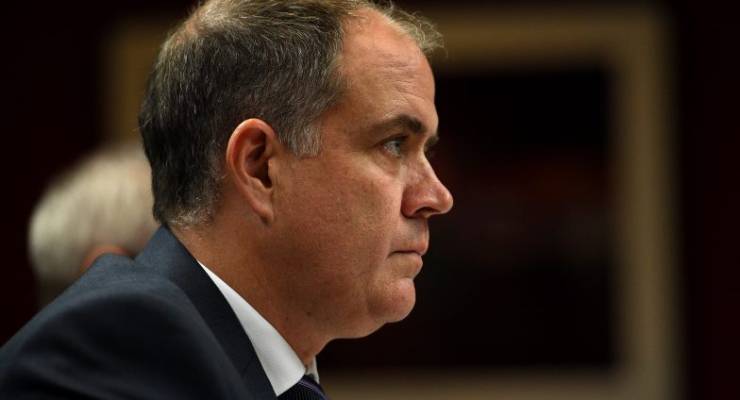
There is a scene in next year’s Miriam Margolyes: Almost Australian documentary that could encapsulate the ABC’s relationship with its audience.
Margolyes, the British character actress turned Australian citizen, takes a road trip around the country and meets an older bushie in a pub. “Have you ever met a lesbian before?” she asks provocatively.
There is a pause, it could turn hostile, we can’t tell, before the man replies… “Shit yeah.”
This could be the ABC and its viewers. Aunty: “You need to watch our content on these important issues.”
Australia, sitting back, with a beer in hand: “Mate, we’ve already got this.”
The ABC 2020 Upfronts, where the broadcaster announces its programs for next year, was a slick, smooth-running affair held in studio 22 at the broadcaster’s Sydney Ultimo headquarters.
It is a broadcaster in transition. Already the horror show of the ABC managing director Michelle Guthrie’s sacking and resignation of ABC chairman Justin Milne, just 14 months ago, has receded into history, while outside the studio, the $33 million program to remove flammable cladding, shrouding the place in scaffolding, is a reminder of the ABC’s budget pressures. Certainly, it is to be hoped that next year’s programming slate is not as cheap as the Australian sparkling offered up after the event.
Critics will say the broadcaster’s 2020 programing is the ABC following its obsessions: climate change, paedophile priests, Indigenous rights, asylum seekers.
Thus: Craig Reucassel presents Fight for Planet A: The Climate Challenge, examining practical ways to reduce household carbon footprints; the ABC will screen Stan Grant’s Adam Goodes documentary The Australian Dream; Cate Blanchett is the executive producer of the asylum seeker drama Stateless; author Bruce Pascoe takes his fresh perspective on Indigenous history, Dark Emu, to the small screen.
Keeping the ABC connected with audiences while competing with an abundance of streaming options keeps ABC managing director David Anderson up at night. Michael Carrington, ABC director of entertainment & specialist echoed this concern.
“In a world overrun by global media giants, Australian stories have never been more important. Equally, the ABC has never been more essential to the Australian people,” he said. The ABC would “speak to and for all Australians” and put “more Australian faces, voices and stories on screen than any other broadcaster” he said.
The most important new program will be Revelation, presented by journalist Sarah Ferguson , who said the series would an “extraordinary set of world television firsts”. It will follow court trials involving Catholic priests charged with abusing children, and also include interviews with convicted paedophile priest in a maximum security prison. The third episode in the series could not be discussed, Ferguson said, and no one would say if this finale episode involved Cardinal George Pell or not.
The freshest program could be Reputation Rehab, a factual entertainment series where (Inq reporter) Kirsten Drysdale and Zoe Norton Lodge investigate victims of social media storms and see if they can change people’s hearts and minds.
The event underlined the ABC’s ability to lure in top talent from the commercials. The headline news was that The Project co-host Hamish Macdonald would front panel show Q&A next year.
Many viewers, who shun the program, think it needs to change utterly. Already Monday’s controversial feminist Q&A episode where female panelists advocated violence has attracted more than 200 complaints and an ABC investigation.
Macdonald at the helm of Q&A and Sky News’ David Speers hosting Insiders means these two external hires, as opposed to traditional “ABC lefties” helming the ABC’s most politically controversial programs, will transform ABC government relations.
Thanks mainly to Prime Minister Scott Morrison, things feel very different. Despite the federal government freezing its budget indexation over three years, effectively costing it $83.7 million, the ABC no longer feels under siege.
Certainly, the ABC and government are no longer at each other’s throats as they often were under Tony Abbott and Malcolm Turnbull. After Q&A this week Turnbull government communications minister Mitch Fifield would have been out of the stalls faster than Vow And Declare to attack the ABC. But his successor, Paul Fletcher, couldn’t have been more mild, saying the decision of the ABC to investigate was “appropriate”.
In other programs, teetotaller Shaun Micallef will front On the Sauce, looking at our love of alcohol. The comedian, who will be back for two series of Mad As Hell next year, won the award for burn of the day, as he introduced himself and took a dig at Charlie Pickering, who was also present. “I’m from Mad As Hell. For those of you who don’t know Mad As Hell it’s like a comedy version of The Weekly.”
Certainly at the launch the ABC laid it on thick, with commitments to First Australians, diversity and inclusion mentioned continually. In fact, the only place where this commitment to diversity evaporates is at the top of the ABC. The board and executive team are whiter than a loaf of Tip-Top Sunblest.
It is easy to chide the ABC for wokeness, and I made passing reference to this to an ABC staffer on the way out, who smiled and said “well this is the national broadcaster”. But if the ABC doesn’t tell these stories, who else will?








For all the complaints about it, the ABC is still the least imperfect mass medium available in Australia. At least you sense it’s doing its best to fulfill its charter.
And to think that, at its zenith, we peasants were charged a paltry 8 cents a day.
It can’t be that hard to beat the paltry offerings on the commercials. They seem to be wall to wall faux reality dished up in more guises than you can poke a silly face at.
Stories about us, pride in the lives we actually live, our own comedy and a take on real issues. Sounds good to me and entertaining as well. Sure I like a bit of escapist junk just as much as I still love hot chips. But you can’t live on it without getting bloated and ill.
Did anyone check whether or not all those 200 complaints about Monday’s Q+A were from males?
Maybe if the ABC didn’t have its balls hanging up in Morrison’s office then we’d actually be able to iview the program and make up our own minds on the program instead of having it censored for us by the ABC under government edict. Can’t have the people exposed to radical and new ways of thinking, can we?
‘Many viewers, who shun the program, think it needs to change utterly.’ Really! I’ve heard mutterings at Crikey before about Q&A, but never any constructive ideas as to how it should change. Sure they have good shows and not so interesting (to me) shows, I turned back to back to ‘on line’ viewing 5 minutes into the feminist show the other day. I don’t see anyone else doing it better, as I’ve mentioned before, maybe Crikey should have a go.